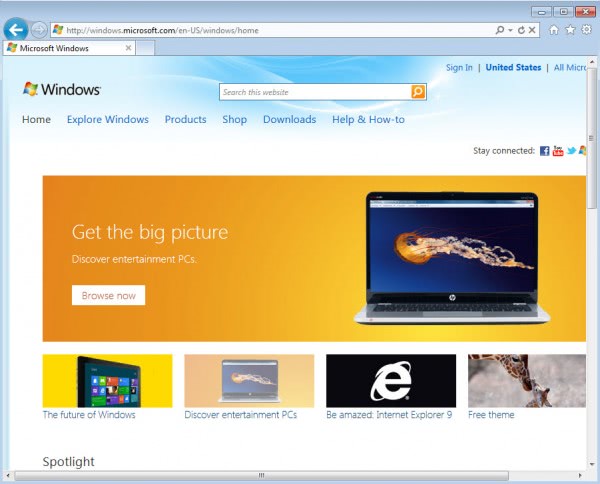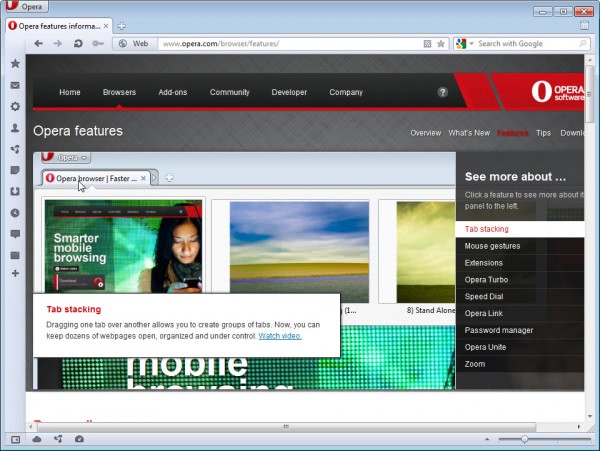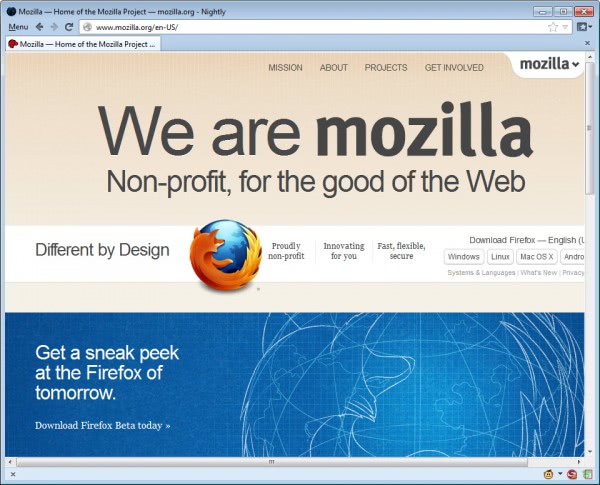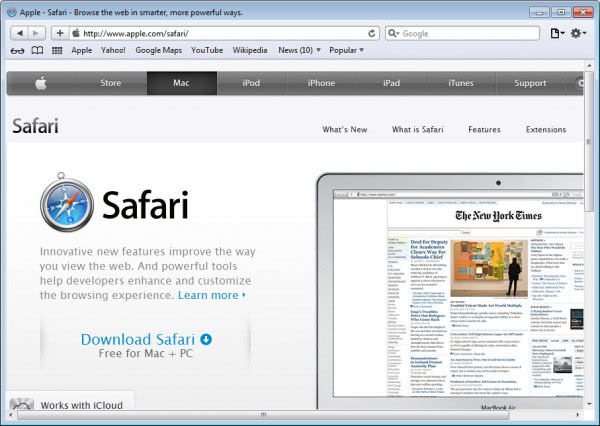Today's Web Browser Landscape

The web browser landscape has changed considerably in recent years. Especially the introduction of the Google browser has shuffled around the landscape quite a bit. On today's Internet, there are five major web browsers who all have a market share of more than 1%. Of the five, three got the backing of multi-billion Dollar corporations, while two, Mozilla Firefox and Opera, are maintained by smaller organizations and companies.
Below you will find an overview of today's web browser landscape, and a list of lesser known alternatives that you may want to take a look at as well.
Microsoft Internet Explorer
Internet Explorer has come a long way, and it appears that Microsoft is finally putting resources behind the web browser. Internet Explorer 9 is a step in the right direction, especially when compared to previous versions of the browser. IE9 is faster, supports a variety of newer technologies (could be better but still), and is a force to be reckoned with thanks to its integration into the Windows operating system.
Internet Explorer 10, which will come out later this year when the Windows 8 operating system gets released, will improve the browser further. If there is one thing to criticize it is the beginning fragmentation of the browser, as Microsoft limits newer versions of the browser to the last two released operating system. For Internet Explorer 9 it means that Windows XP users won't be able to install or upgrade to the browser, for Internet Explorer 10, it is Vista users who share the same fate.
Opera
Opera has been the underdog in the desktop browser niche for a very long time despite being around for more than 15 years. One reason for not getting enough traction in the browser market is the lack of marketing resources that Google for instance made massive use of to push the Chrome browser into the market.
Opera itself is still seen by many as one of the most innovative browsers around, which can be attributed to technologies like Opera Turbo and other improvements that were introduced into the browser. Not all of them paned out as intended though, especially the widget engine lacked features when compared to Firefox extension engine. Opera has however introduced its own extension engine recently.
Currently a rumor makes the round that Facebook is interested in buying Opera Software which could offer new opportunities for the browser, but also alienate part of the browser's loyal following.
Mozilla Firefox
The rise of Google Chrome has hurt the Firefox web browser, at least when it comes to market share. Back when Firefox first entered the field it was considered innovative thanks to its extensions engine which allowed third party developers to create add-ons for the browser to change, remove or improve functionality.
The last two years have been particularly troublesome for the Firefox browser, first because of the rise of Google Chrome, but then also because of changes that the developers introduced. Especially the switch from Firefox 3 to 4, and then the decision to follow Chrome's release often policy need to be mentioned in this regard. It did not help either that the first five or six versions of the rapid release process did not really introduce highly visible features to the browser.
This is however changing right now, with the two digit versions of the browser introducing much needed improvements to the browser's memory usage, overall performance and underlying technologies.
Alternatives include Pale Moon, an optimized version for Windows.
Google Chrome
The Chrome browser jump-started into popularity thanks to Google's marketing efforts and the fact that developers concentrated on speed first. It is still one of the fastest, if not the fastest, browsers on today's Internet, even though not by as much as before.
Google managed to establish the browser in record time, with some analysts seeing it in the top spot browser market share wise. It is a functional browser with some interesting technologies that however lacks some features that browsers like Firefox or Opera offer. In terms of interface customizations for instance, it is worse than Microsoft's Internet Explorer.
Google appears to have reduced its marketing efforts recently, likely because the browser reached a critical mass, and because of the company using the same strategies to increase the market share of its Google+ service in very much the same way.
If you do not like Google's browser, try its Open Source alternative Chromium, or more privacy orientated spin-offs like Cool Novo or SRWare Iron.
Safari
Apple seems to be the only company that is not putting lots of efforts behind the Safari browser. That's not making the browser inferior to others, especially not since it is sharing the WebKit core with the Chrome browser. The lack of support however holds the browser back. While it still managed to gain some traction, this can mostly be attributed to it being the default web browser on Macintosh systems, which in recent time have grown in popularity.
It is not a bad browser by all means but there is also nothing special about it that would make users switch to Safari, especially since much of the technology and feature set is also included in Google Chrome.
Others
A handful of niche browsers are available that the majority of the Internet community probably has never heard of. Here is a small selection of browsers that fit the profile.
Maxthon has a lot going for it. The Windows browser comes with Chrome's fast rendering engine, and Microsoft's Internet Explorer engine, so that it is possible to switch between engines whenever needed. The browser recently managed to surpass Chrome in the HTML5 test and packs additional interesting features like an option to download videos from video sites like YouTube.
SeaMonkey is based on the Firefox web browser, but aims to be a full application suite rather than a single-purpose web browser. It is in this regard similar to Opera, which also includes email and newsgroup clients, IRC chat and other features that the majority of browsers do not ship with.
Lunascape includes rendering engines from Chrome, Internet Explorer and Mozilla. Especially the integration of Firefox's engine is interesting in this regard, as it allows users to run Firefox add-ons in the browser. You can read a recent review of Lunascape here.
Avant Browser, another browser that ships with three rendering engines, which are actually the same that Lunascape ships with.
Advertisement























I agree with the negative comments about Opera.By all means mention it but for crying out loud,it’s no headliner & it’s always touted as such.
I use Chromium & portable Avant which are both excellent.Opera should be buried in Others with Avant as one of the more obscure browsers.
If I ever left Mozilla’s Firefox (as my default browser) someday for whatever reason, there’s no doubt I would go to Opera. Many “addons” are standard features in Opera. In fact, many addons are Opera features that are developer-created later for Firefox and Chrome. Pages load quickly thanks to a compression of data through their servers. I like their mini browser for smartphone. And, if you’re a Web Developer, they have “Dragonfly” tools built right in. They’ve been around a long time and have really honed their craft.
Mozilla on CISPA :
“While we wholeheartedly support a more secure Internet, CISPA has a broad and alarming reach that goes far beyond Internet security. The bill infringes on our privacy, includes vague definitions of cybersecurity, and grants immunities to companies and government that are too broad around information misuse. We hope the Senate takes the time to fully and openly consider these issues with stakeholder input before moving forward with this legislation.â€
Other web browser makers, such as: Opera Software, Maxthon, Google and Apple remain silent.
( From : http://www.favbrowser.com/mozilla-microsoft-not-happy-with-cispa/#more-11661 )
once in a month entire understanding on your tutorial material and day to day interaction will be sent to you very soon .
OpenOperaUnited: Preserve Opera! Our fight has changed, we need your help. So far “204” have joined our efforts, but we need more signatures to show Opera to not allow Facebook to take over. Much more is at stake then anyone can imagine.
http://www.ipetitions.com/petition/openoperaunited/
Interesting debate. I like Avant for portable use. Chrome tends to run better in my imagination when using a Linux OS. I nearly switched to Opera this year because of Opera Unite–too bad. Safari is good. I mean, I use them all, so . . . oh, whatever point was made about the coding nightmare, I know IT at work gets really upset because they need to install three browsers “just in case.” Some pages don’t render IE very well, so we sometimes have to switch to Chrome or FF. One of the techs praises Opera, so I suppose we’ll have four browsers soon.
I didn’t know such browser bigotry existed in the world today. Better watch my mouth when out on the town. Should I change my skin color? My skin is rather dark. And my religion? Ouch! Mormon . . . .
Palemoon is nice becouse cuts down some ff bloatware, works many ff addons , but many dont, also its messing up interface a little (-at least my very tweaked)-new profile may be is better to have.
Waterfox 64bits works on FF profile without problems.
Chromium ,Iron instead GoogleChrome is a way to go .Comodo Dragon – safety maybe increased but not privacy – Comodo corporation is as bad as google I suppose.
Other webkit engine based alternative browsers: Maxton, qupzilla,Qtweb,midori,ecran
-while having some v.attractive features
– have decreased possibilities in customising privacy/safety/adblock/noscript -like features comparing to Mozilla’s engine –
maybe not without a reason…..
Lets hope Mozilla don’t join “dark side of power” =chromifi-spy-cation -can still be opt-out ….
Opera now can be tweaked v.well, but if you can trust this firm real policy more then Google ? It’s not open source .
What is their stance on all SOPA,PIPA and so on, attempts on internet as we know it ?
I’d like to see comparison of those firms , and even more ISP in US, in this regard.
If someone has any links on this share here,please.
http://us.cnn.com/2011/TECH/web/07/29/internet.explorer.dumb/index.html?hpt=hp_t2
Chrome is nice but it lacks many options most browsers have.
Like changing the location and size of the cache, I know theres command line for those but its like they are hiding it (and the command to change Cache size doesn’t seem to work well).
Also the lack of option to limit the history.
And theres the concern of Google knowing what you’re doing through Chrome, and not having those options mentioned further the suspicion.
It feels somewhat like how iPhone locks down the user vs the freedom of Android.
Took me quite sometime (and Maxthon was kind of stagnant back then) to switch to ChromePlus.
Now ChromePlus becoming CoolNovo starts to bloat and have memory leaks.
Don’t think I’m going to Google’s Chrome, for privacy concerns and also CoolNovo’s built-in mouse gestures and auto-hide bookmarks bar and sidebar are too good to let go.
Also I’ve grown accustomed to some Chrome extensions so I can’t go back to Maxthon (bearly any useful extensions to me) or to Firefox (the best, utimate extensions system but lack something like All Mangas Reader).
By the way browser starts slow after loading a few extensions into it, equivalent exchange for the extensions’ functions I suppose :P
Opera doesn’t score at all in the security category here:
http://html5test.com/
What is it that everyone is goin’ Facebook?
People don’t even have friends on their own street and have 1,000,000 virtual ones? Big deal!
Even Bing has gone Facebook! Sheesh!
You know, the more i look at Opera, the less i like.
They’ve taken away skin (replaced by dull themes);
Sync feature (bookmarks, notes etc.) is rather ineffective.
New online email is stagnant.
Mozilla is the only way to go.
It was the browser that came to our rescue when IE was having security issues big time (not to mention stagnant with regards to any improvements or enhancements).
Firefox is the most flexible and the only true alternative to big company takeover manipulations.
Opera browser belongs in this overview, so simple is that !!
Although this browser is too complex for me, it has a lot of features that other browser makers just copied into their own one. I think Opera is the most safe browser at this moment, and NOT Chrome.
Wow. First time I’ve ever encountered Opera haters. Most people that actually use it seem to love it. I think it is more popular in Europe than anywhere else. That’s just based on my casual observations. I could be totally wrong.
I have tried to use Opera. While it is a nice browser and does seem to have different features than the others, (Is that what “innovation” means?), I was unable to use it as a default browser. I ran into too many problems, which was a big surprise. If it wasn’t for that I would probably be using it today.
Instead I’m using another de-Googled version of Chrome, Commodo Dragon. Although I still have to use an IE plug in for some of my work sites, it generally works well. I’ve drifted away from FF, which is sad since I started using it back at Mozilla version 0.9.
Thought I would post an update. I’ve gotten tired of Comodo’s insistence on putting an icon on my desktop and now they’ve started forcing my homepage back to their page during each update. While it is otherwise a good browser, these irritants have forced me to explore other options. Based on iron2000’s comments I thought I’d give CoolNovo a try. Looks good so far. Although it doesn’t seem as “snappy” as Dragon, I like the built-in features. If this one doesn’t pan out I guess I’ll be going back to Chromium or FF.
Yet another update. CoolNovo proved to be too buggy to use. The memory leaks are more severe than anything I ever experienced with FF, so it’s off the table until they fix it. Too bad, it’s a good browser otherwise. Now I’m back to FF.
I’ve never understood why in IE9 they didn’t use the same address bar layout as it does in full screen mode.
As you can see in the screenshot, the area above the address bar is just wasted screen real estate. In full screen mode, it puts the address bar on the same ‘line’ as the close/minimize icons on the right, so takes up less room.
As a web dev articles like this really piss me off.
Ever since the IE monopoly every tech journalist thinks it’s necessary to include Opera in these sort of articles. Why? Opera is irrelevant. It has barely 2% of share if that. Opera has never been a substantial market share browser and probably never will. Yet ‘journalists’ keep listing it and nobody gives it any attention regardless.
Safari on Windows is the same story.
Any web dev who can afford to test on the three major browsers and still play around with opera and safari-win is very privileged indeed – or simply has too much time on their hands.
Please call an end to the pathetic story that Opera is. Stop promoting it and do something useful like analysing the bugs in each browser. For example it’s 2012, why do developers need to do work-arounds to style a select box? Mozilla and Microsoft don’t support this, that’s why. When the landscape of browser support for quality coding improves, you’ll be doing the world a favour by facilitating faster, cleaner, less-memory/processor/battery-hogging sites. Surely that is more important than promoting a browser that pretty much exists on bread and water as irrelevantware.
I can’t believe that I’m even bothering to comment, but, like you, I have nothing better to do with my time.
As far as Opera, go tell these people >
http://my.opera.com/community/forums/
Opera is a great browser and if I were not using Firefox, I’d be using it. Not Chrome, not IE, not anything else.
I’m glad that it is available, as well as all of the other lesser known browsers and software overall so that there is always a choice.
Most of us enjoy the articles on this site and respect the author.
He’s being responsible, accurate, and honest by including Opera and Safari unlike a lot of the mainstream tech sites where the authors trash one product and promote their own personal favorites.
The job is to review and report what’s out there, not dictate what should and shouldn’t be.
I believe your comments are ‘way out of line.
I installed and began using Opera about 12 years ago (on the recommendation of a friend) and it has been a solid, reliable performer ever since. I also have installed Firefox and Chrome, and while I like Chrome’s performance in most respects, I do NOT like the fact that I cannot give my own name to the files that I download with it; most aggravating is that I have to close the Chrome browser to allow CCleaner to run properly.
I do not allow Internet Explorer (in ANY version) to be on any of my computers. Still too many security issues in spite of reassurances from Microsoft.
Opera may not be a major “market share” holder, but it is certainly a worthwhile and viable browser.
So Linux and Mac OS X are irrelevant as well and everyone should stop writing about those operating systems? One or two percent still means millions of users, hardly irrelevant if you ask me.
This is a very true comment. well said. Opera is a waste of space and in the last 8 years where I have worked in web design studios and now in a web development app, have I ever considered testing in opera. Nobody gives a toss about it so please stop rattling on about it.
Also promoting ie9 smacks of kickbacks. It was never a good or fast browser.